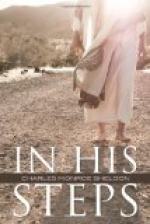“Or take the case of Mr. Norman, editor of the daily news. He risked his entire fortune in obedience to what he believed was Jesus’ action, and revolutionized his entire conduct of the paper at the risk of a failure. I send you a copy of yesterday’s paper. I want you to read it carefully. To my mind it is one of the most interesting and remarkable papers ever printed in the United States. It is open to criticism, but what could any mere man attempt in this line that would be free from criticism. Take it all in all, it is so far above the ordinary conception of a daily paper that I am amazed at the result. He tells me that the paper is beginning to be read more and more by the Christian people of the city. He was very confident of its final success. Read his editorial on the money questions, also the one on the coming election in Raymond when the question of license will again be an issue. Both articles are of the best from his point of view. He says he never begins an editorial or, in fact, any part of his newspaper work, without first asking, ‘What would Jesus do?’ The result is certainly apparent.
“Then there is Milton Wright, the merchant. He has, I am told, so revolutionized his business that no man is more beloved today in Raymond. His own clerks and employees have an affection for him that is very touching. During the winter, while he was lying dangerously ill at his home, scores of clerks volunteered to watch and help in any way possible, and his return to his store was greeted with marked demonstrations. All this has been brought about by the element of personal love introduced into the business. This love is not mere words, but the business itself is carried on under a system of co-operation that is not a patronizing recognition of inferiors, but a real sharing in the whole business. Other men on the street look upon Milton Wright as odd. It is a fact, however, that while he has lost heavily in some directions, he has increased his business, and is today respected and honored as one of the best and most successful merchants in Raymond.
“And there is Miss Winslow. She has chosen to give her great talent to the poor of the city. Her plans include a Musical Institute where choruses and classes in vocal music shall be a feature. She is enthusiastic over her life work. In connection with her friend Miss Page she has planned a course in music which, if carried out, will certainly do much to lift up the lives of the people down there. I am not too old, dear Caxton, to be interested in the romantic side of much that has also been tragic here in Raymond, and I must tell you that it is well understood here that Miss Winslow expects to be married this spring to a brother of Miss Page who was once a society leader and club man, and who was converted in a tent where his wife-that-is-to-be took an active part in the service. I don’t know all the details of this little romance, but I imagine there is a story wrapped up in it, and it would make interesting reading if we only knew it all.




